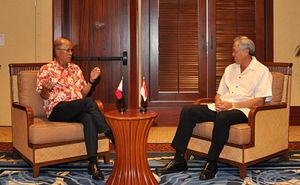From January 23 to 25, Philippine Defense Secretary Delfin Lorenzana paid an introductory visit to Singapore. Though his discussions covered a range of topics, ASEAN and regionalism were a focus given his country’s chairmanship of the association this year, which it will then hand over to the city-state in 2018.
Lorenzana’s agenda for his first visit as defense secretary included inspecting a Guard of Honor at Singapore’s defense ministry (MINDEF), meeting with his Singaporean counterpart Ng Eng Hen, delivering an address at a key regional meeting, and visiting several defense facilities.
According to a statement by MINDEF, Lorenzana’s meeting with Ng included a range of security issues but also noted the two countries’ close cooperation in regional forums like the ASEAN Defense Ministers’ Meeting (ADMM) and the ADMM-Plus.
That is no surprise, since these ASEAN forums have become not only a place for Southeast Asian states to foster cooperation amongst each other, but a platform for them to engage major powers and for these powers to interact among themselves. In particular, the ADMM-Plus – which groups the ten Southeast Asian countries in the ADMM along with the United States, China, Australia, India, Japan, South Korea, New Zealand, and Russia – is now often referred to even by powers like the United States as the emerging premier venue for defense and security issues in the region.
For instance, one of the issues discussed was cybersecurity, where both countries have played key roles. It was the Philippines that proposed establishing a cybersecurity working group within the ADMM-Plus, to add to the six other existing working groups, on humanitarian assistance and disaster relief (HADR); maritime security; military medicine; counterterrorism; peacekeeping operations; and humanitarian mine action (See: “ASEAN Defense Chiefs Agree to New Cybersecurity Group”). The Philippines is currently co-chairing the new working group on cybersecurity with New Zealand until 2020.
Meanwhile, Singapore, for its part, has been focusing on strengthening regional partnerships as part of its cybersecurity strategy. In addition to efforts it had previously pursued, last October the city-state hosted the inaugural ASEAN Ministerial Conference on Cybersecurity, where it also announced a new initiative to boost ASEAN capacity to tackle cyber threats known as the ASEAN Cyber Capacity Program (ACCP) (See: “Singapore Unveils New ASEAN Cyber Initiative”).
Lorenzana also visited the 2nd People’s Defense Force and the Changi Command and Control Center. His trip to the Changi Command and Control Center was especially notable, since it houses the Changi Regional HADR Coordination Center (RHCC), which, since it became operational last year, is being seen as a regional hub to promote the sharing of best practices and enhance coordination among Asian militaries in this field. There, he witnessed the inaugural Exercise Coordinated Response – the first multinational HADR exercise jointly organized by the RHCC along with the Philippine military as well as the United States’ Center for Excellence in Disaster Management and Humanitarian Assistance.
During his trip, Lorenzana also delivered a special dinner address at the fifth annual IISS Fullerton Forum, which helps set the stage for the Shangri-La Dialogue later this year. His remarks focused on the Philippines’ vision for its ASEAN chairmanship and the significance of the regional organization in addressing current security challenges. Lorenzana emphasized that ASEAN was both a global player and a model for regionalism and requested that IISS include these as topics for the upcoming Shangri-La Dialogue. He also noted that the Philippines would work with other Southeast Asian states to help streamline and rationalize regional processes.

































